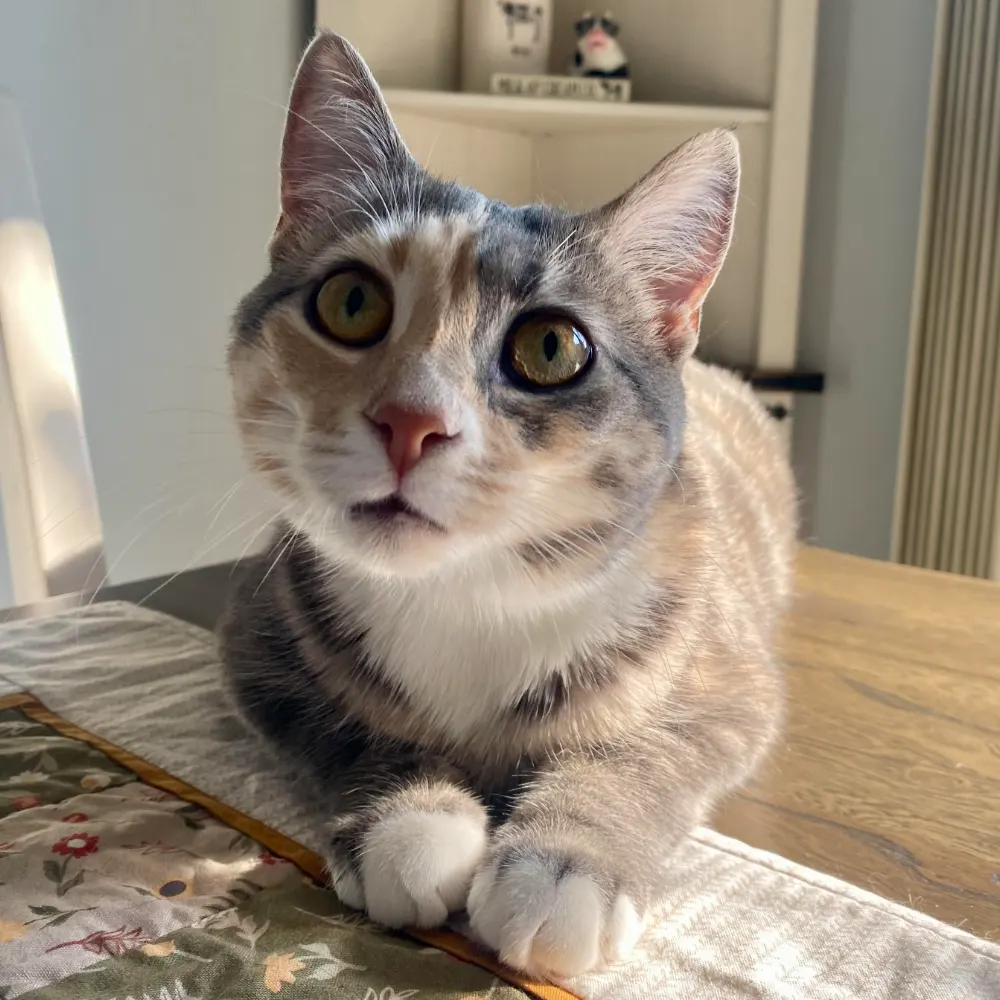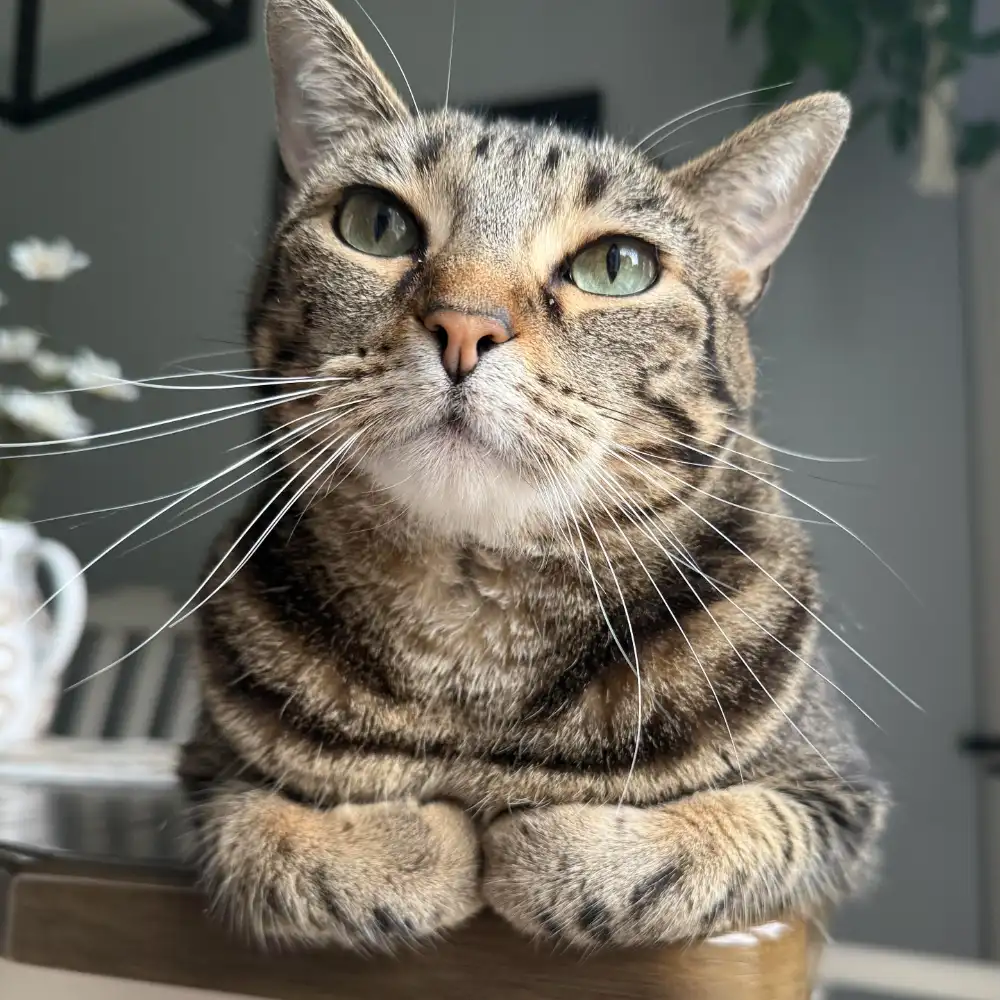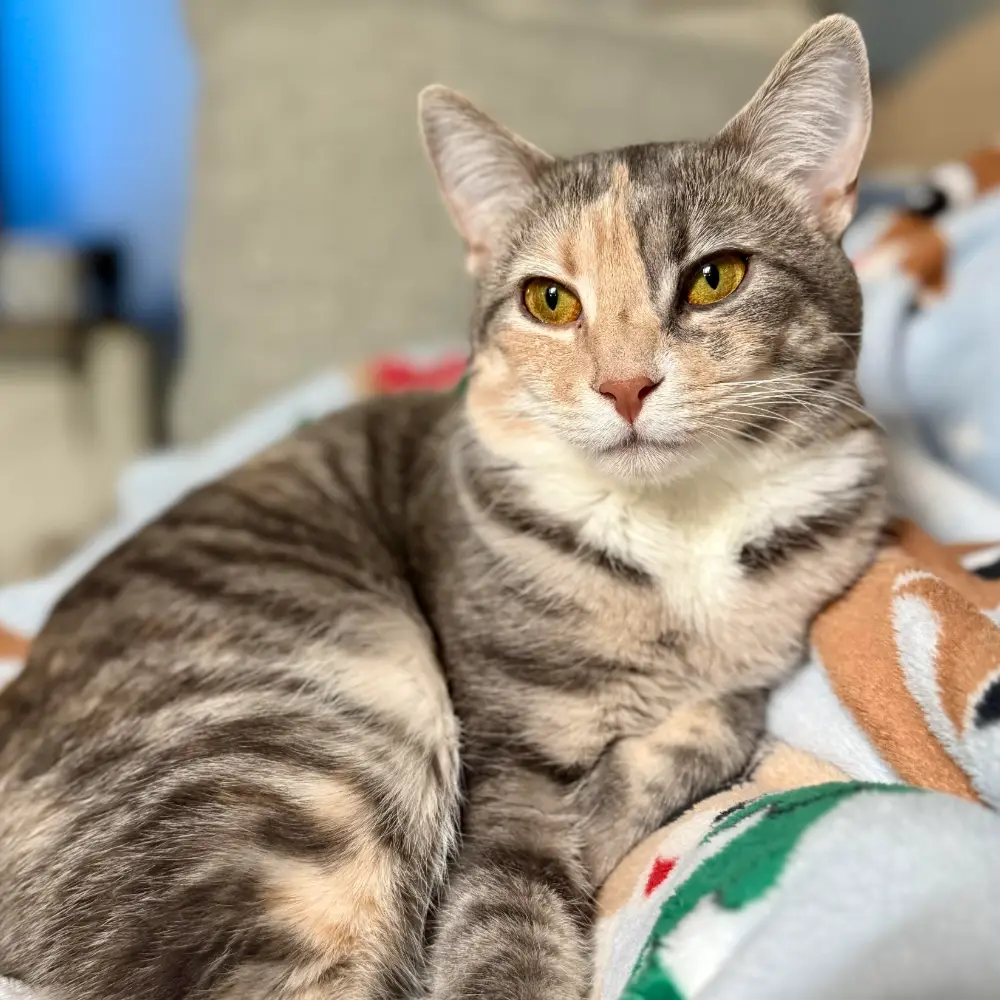
You know how they say dogs look like their owners? Well, I’m convinced that cats act like their owners. Being a very anxious person myself, I started to notice that my cat Hazel was developing a little anxiety after a few months of her living in our home. Now, I’d like to think that it was coincidence that she started becoming very anxious, but maybe she just picked up on my anxious nature. Regardless, many cat owners will find themselves with an extra jumpy or nervous cat at some point in their lives. Maybe you have and that’s why you’re here! Fear not. I’ve got some home remedies that will help with cat anxiety. Keep reading for signs that your cat may have anxiety and how to calm your anxious fur baby.
Note: I am not a medical professional, and this article is not to be taken as medical or veterinary advice. Always contact a veterinarian regarding concerns about your pet’s health or behavior. Additionally, Caitycat is a participant in the Amazon Services LLC Associates Program, an affiliate advertising program designed to provide a means for sites to earn advertising fees by advertising and linking to amazon.com. As an Amazon Associate, I earn from qualifying purchases. This post may contain affiliate links, which means I may receive a commission, at no extra cost to you, if you make a purchase through a link. Please see my full disclosure for further information.
Subscribe to my newsletter for all things cats!
Pin it for later!
What Is Cat Anxiety?
Before we get into how to recognize if your cat is anxious and some home remedies to help your kitty, let’s go over what cat anxiety is. Many of us hear the word ‘anxiety’ on a daily basis, but anxiety is actually a disorder that affects not only humans, but our furry friends too.
According to PetMD, approximately 20-25% of cats exhibit anxious behaviors. Anxiety in cats is defined as nervousness or worry that surfaces when a threat is anticipated. Whether this threat is real or not, a cat with anxiety will react with the same fight or flight response that they would have from a perceived threat in the wild.
There are actually a few different types of anxiety that a cat can have, such as general anxiety, separation anxiety, OCD (obsessive-compulsive disorder), and noise-associated anxiety. Sometimes a cat will have more than one type of anxiety at once, which I supsect my girl Hazel does.
Signs That Your Cat Has Anxiety
Now that you know what anxiety is in cats, I’m going to tell you how to recognize that your cat may have it. Here are 5 signs that your cat may be anxious (and I’m telling you this from experience, because let me tell ya, Hazel is the poster child of cat anxiety).
1. Your Cat Jumps at Every Noise
If you find that your cat is always jumping or sprinting away whenever you make any noise (I’m talking opening a bag of chips), it may be a sign of anxiety.
Sure, it’s normal for a loud noise to startle an animal. But if a cat is reacting in an extreme manner to very normal and common noises in the home, it might point to anxious behavior.
2. Your Cat Excessively Grooms Themselves
Overgrooming is another sign that something might be off with your cat. It doesn’t always instantly point to anxiety, as overgrooming is linked to boredom, pain, allergies, and infections. However, if paired with other signs, it could point to feline anxiety.
Always contact your vet if you notice overgrooming to rule out other health issues in your kitty.

3. Your Cat Has Gastrointestinal Issues
Now, this one surfaces fairly often in my home, unfortunately. We suspect Hazel has some form of IBD (inflammatory bowel disease) that is worsened when she’s anxious.
I say this because when I was introducing Hazel to my cat Luna when we first brought her home, her gastrointestinal issues were so, so terrible. My poor baby. She was very anxious as it took Luna a bit to warm up to her. And now, if we leave for a vacation for a while, Hazel gets some separation anxiety and will have potty issues when we return home.
If your cat exhibits anxious behavior and also has some gastrointestinal issues, it may or may not be related. However, if your cat has gastrointestinal issues due to another health problem, it can definitely be triggered or made worse by anxiety.
4. Your Cat’s Body Language Seems Off
If you notice your cat constantly has dilated pupils, has their ears back, or has their tail tucked, it could point to anxiety. Cats will exhibit these behavior changes for other reasons as well, but if it’s excessive, it’s worth looking into.
5. Your Cat’s Appetite Changes Often
Changes in appetite can point to many health issues in cats, including anxiety. This can tie into the gastrointestinal issues I mentioned earlier. If your cat’s tummy isn’t feeling too good due to their anxiety, this can cause them to eat less than usual. On the other hand, your cat may eat more than usual as a way to cope with their anxiety (we’ve all been there). We frequently notice appetite changes in Hazel.
Home Remedies for Cat Anxiety
If you’re starting to suspect your cat may have an anxiety disorder, there are plenty of home remedies you can try to treat your cat’s anxiety. Of course, it’s always best to talk to a vet if you’re concerned about any health issues arising from their anxiety. I have personally had success calming Hazel’s anxiety, or at least keeping it under control, with these methods.
Keep Noises to a Minimum
This is easier said than done, but try to avoid triggering your cat’s anxiety by keeping loud noises to a minimum. It’s been an adjustment in our home, but we have noticed Hazel is a lot calmer when her triggers are avoided.
Also, don’t sneak up on your anxious cat. Some cats enjoy this because it’s how they play, but this will just make your cat’s anxiety worse.
Use Calming Diffusers
You may have heard of pheromone diffusers that keep cats calm, but if not, let me introduce you to them.
These diffusers help to calm cats because they release synthetic pheromones that mimic real calming pheromones cats release in the wild. Vet offices often use these as visits to the vet can be very stressful. They also come in handy in multicat households where cats may not get along very well.
The diffusers I’ve successfully used in my home are the FELIWAY brand diffusers, and I’ve had good luck with them. I notice my cats are much, much calmer when they are plugged in.
You can get these diffusers on Amazon here: https://amzn.to/4livGgT.

Provide Extra Playtime for Your Cat
While it’s well known that cats need a certain amount of playtime in a day, cats with anxiety can benefit from longer playtimes than other cats. In my home, I’ve noticed that playing with Hazel for a while gets her energy out and she tends to be a lot less anxious afterwards. It’s similar to how exercising can help humans with anxiety.
Toys like wands or laser pointers are the best for getting a cat’s energy out by running around and chasing them.
My favorite laser pointer that I use for my cats is linked here: https://amzn.to/46FuuQZ.
Create a Safe Space for Your Cat
It’s important that a cat with anxiety has a safe space to retreat to when they are feeling anxious. You can accomplish this many ways. For example, you can create a corner in a room with a comfy bed and blanket. Or, if space allows, you might even decide to create an entire ‘cat room’ with plenty of places to climb and hide.
It’s also important to respect your cat’s safe space and leave them be if they run off and hide. They will be out again when they’re feeling more social to give you lots of purrs and kisses!
In Conclusion
Cats with anxiety may need a little bit more attention and a few more accommodations than other cats. It’s important to be mindful of your cat’s triggers, play with them to get their energy out, and create safe spaces for them in your home. If your cat’s anxiety doesn’t get any better with these home remedies, definitely give your vet a call so they can decide the best treatment for your kitty.
Did you find this article helpful? Let me know in the comments!
See also…



This is so relatable—I actually want to pass this on to one of my friends who has a cat and struggles with anxiety herself. It’s interesting how our pets can mirror our energy. I never thought about it that way until now! Thanks for sharing this—can’t wait to read more about the remedies.
Hi Ann,
I’m so glad you liked the post! It’s so crazy how much our own personalities and emotions can impact our pets. Definitely makes you think about being more intentional!
My cat is the exact opposite (LOL) she’s very playful and inquisitive
Lol! It’s so funny how different cats are! They have such unique personalities. 🙂
Thanks for sharing actionable tips, this would be a great quick reference for any cat owner noticing signs like over-grooming, startle responses, or GI upset in their kitty.
Hi Daniela,
Glad you found the article helpful! It’s always good to be on the lookout for any unusual behaviors in our kitties. 🙂
I love that they have pheromone diffusers now. I got my dog something similar, but it was a stuffed animal that came with drops to put on it. I wonder if the diffuser would work for her.
Hi Laurel,
Definitely worth a shot to see if it works for your pup! I’ve had great success with them. 🙂
This was such a helpful post! I had no idea there were so many gentle, natural ways to help ease my cat’s anxiety at home. I’ve noticed my kitty getting jumpy during storms, so I’m definitely going to try a few of these suggestions. Thank you for making this feel doable without rushing straight to medication!
I’m so glad you found this helpful! There are so many ways we can help ease our kitties’ anxiety without medication. Sometimes it is so severe that medication becomes necessary, but just like with humans, we should always try to improve our environment and avoid certain triggers first. 🙂
These are great tips. I’m allergic to cats so I don’t have any of my own, but after reading many of your posts including this one, I can see myself trying to make my mother in law’s cat happy and looking out for her well being too 🙂 Thanks for sharing!
Hi Kimberly,
So glad to hear my posts have helped you understand cats a little better so you can keep your mother in law’s kitty happy. That makes me happy! 🙂